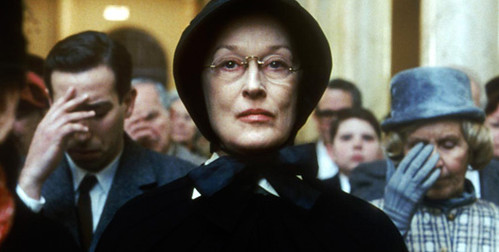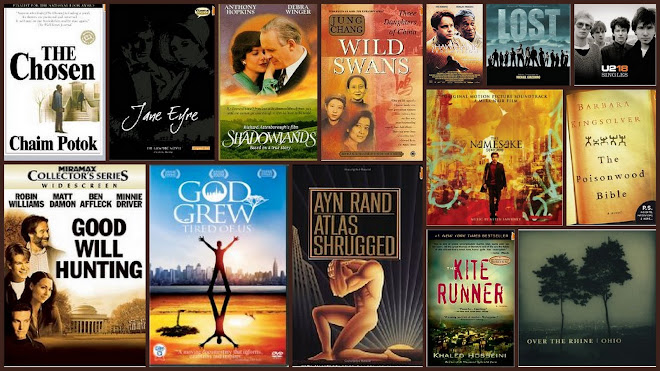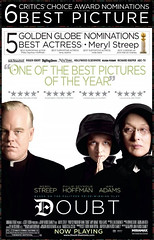Isaac and I knew we wanted to watch Doubt, but it took us a while to get around to it. We actually didn't know all that much about the movie. We knew it had something to do with the child molestation scandal within the Catholic church of New England, and we knew there were some dynamic scenes between Phillip Seymour Hoffman and Meryl Street, but that was about it.
At the end of the movie it only took a moment for Isaac to burst out in frustration about the ending and with Meryl Street and several other things. I countered his thoughts, telling him what I thought the movie was portraying underneath the surface. We totally disagreed - it was almost like we'd been watching two different movies! Then we watched the special features and both Meryl Streep and the director said that this play/movie, more than any other they'd worked on, was interpreted by the viewer. Everyone thinks it means something different. Well... I guess we can be witnesses to the truth of that statement!
I liked a lot about the movie. It was a fascinating and sometimes humorous look inside the Sisters of Charity in NY, just after Vatican II. The writer wrote the story into the school he went to as a child in NY, and the ended up filming at the SAME school, and used one of the nuns he wrote about as an advisor to the film. I love that authenticity, and the movie had a quiet, simple beauty to it.
Hoffman and Streep really are incredible at what they do. Amy Adams matched them, though, and as a trio they were really created a profound story.
*SPOILER ALERT*
The tension of the movie is over the suspicion that Streep's character has that Hoffman is pursuing and molesting a new boy in the parish school. I was going to summarize the plot but I can't be bothered. I'm just going to tell you what I thought about it.
To me, the movie made absolute sense when I thought of it being the perspective of someone outside of the church looking into the church and trying to understand how the church struggled with these scandals or rumors of scandal.
Although Streep's accusations are never proven, I thought what the story assumed that Hoffman was gay. That this is his nature is just the presupposition of the world-view, and so there is great tension as the author tries to understand and portray what it would be like for a kind, believing man to wrestle with a nature that is considered sin by the church. Hoffman struggles with doubt, he struggles with his mind. I think the story hinted that he never acted on his "nature", but that it haunted him, and that was what left him feeling fearful and guilty in the fact of Streep's brutal judgemental ism. The writer of the story is deeply sympathetic to Hoffman's character.

Then there's Streep. She is how people picture the unbending, judgemental, traditional side of the church. She believes in right and wrong, she simply KNOWS she's right about Hoffman, and she is effective in her discipline and drive, she just isn't NICE. What was fascinating to me about her is that her moral code is her own - it isn't driven by scripture or by the Catholic church tradition. I found this interchange to be fascinating:
Father Brendan Flynn: You have no right to act on your own! You have taken vows, obedience being one! You answer to us! You have no right to step outside the church!
Sister Aloysius Beauvier: I will step outside the church if that's what needs to be done, till the door should shut behind me! I will do what needs to be done, though I'm damned to Hell!
The shocking scene at the end of the movie that didn't make sense at all to Isaac showed Streep's character break down into tears and admit to Amy Adams that she is filled with doubts. Isaac took this to mean that she doubts her accusations of Father Flynn, but I took it to mean that she is doubting her faith, and that makes absolute sense to me. She has (in her mind) successfully accused a church leader that is respected, and in some way she's lost her own integrity in the process. Of course when she's condemned someone in a hierarchical system, she now suddenly finds that she's undermined the very ground she stands on. The Catholic church bases much on authority, and when she's questioned it, she's not sure what to believe any more. To me that makes sense, because she's made herself out to the be only thing she really trusts and believes in.
Then there's Amy Adams, who I think is the truly good person to the outsiders looking into the church. They are uncomfortable with Father Flynn because his struggle with sin may lead to the abuse of his power and influence. They are uncomfortable with the intolerance of Sister Aloysius. Amy Adams, though, is the type of religious person that the secular world rather likes. She is innocent, her faith is simple but she clings to it. She assumes the good in people, she loves and cares and commits her life to doing good. The irony of her character is that while I think people like her, they don't believe her. When Adam's character decides she believes Father Flynn is innocent after all, Sister Aloysius's accusation is quite profound: "You just want things to be resolved so you can have simplicity back."
I think that is what the world thinks of good and nice Christians. They like us and they can live with us, but they think we are afraid of anything outside of our simple, ordered belief system.
So - I found the movie quite profound when I looked at it as the view of an outsider looking in. I think they get it wrong half the time, but it is quite telling.






No comments:
Post a Comment